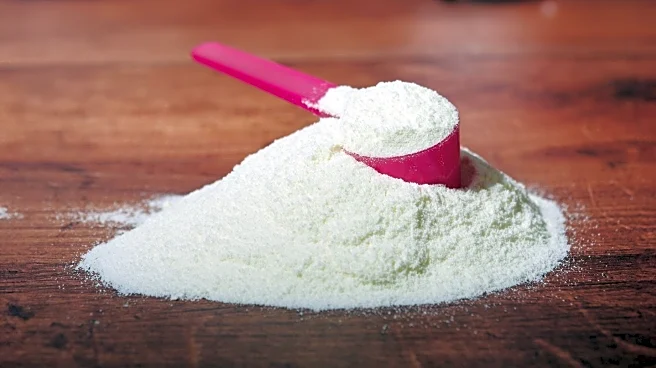What's Happening?
Consumer Reports has released findings indicating that over two-thirds of the 23 protein supplements tested contain unsafe levels of lead. This revelation raises significant health concerns for millions
of Americans who consume these products as part of their fitness or dietary routines. The investigation highlighted that plant-based protein powders exhibited the highest levels of contamination, while dairy-based formulas generally had lower amounts. Notably, Naked Nutrition's Vegan Mass Gainer and Huel's Black Edition powders were identified as having lead concentrations exceeding Consumer Reports' level of concern by over 1,200 percent. The report underscores the lack of mandatory federal standards regulating heavy metal contamination in protein supplements, emphasizing the need for third-party testing and transparency to ensure consumer safety.
Why It's Important?
The presence of lead in food products poses serious health risks, particularly for vulnerable groups. High levels of lead exposure can lead to kidney dysfunction in adults and developmental delays and neurological damage in children. The findings from Consumer Reports are alarming, as they suggest that toxic heavy metal contamination in protein supplements is widespread and has worsened over the past 15 years. This situation highlights the urgent need for regulatory action to protect consumers, as the accumulation of lead in the body over time can have long-term health implications. The report calls for the FDA to set enforceable limits on lead levels in protein powders and shakes, a move that could significantly impact the supplement industry and consumer safety.
What's Next?
Consumer Reports has initiated a petition urging the FDA to establish enforceable limits on lead levels in protein supplements. Currently, the FDA has guidelines for lead in baby food but lacks specific regulations for adult supplements. Without federal oversight, the responsibility for ensuring product safety remains largely with individual companies, some of which claim to conduct regular third-party testing for contaminants. The petition and ongoing advocacy efforts may prompt regulatory changes, potentially leading to stricter safety standards and increased transparency in the supplement industry.










